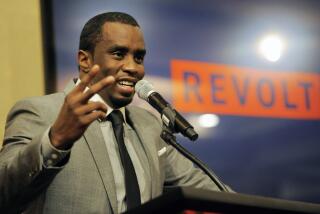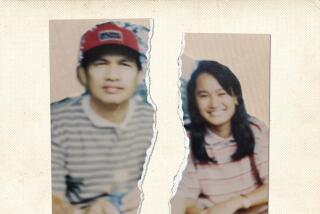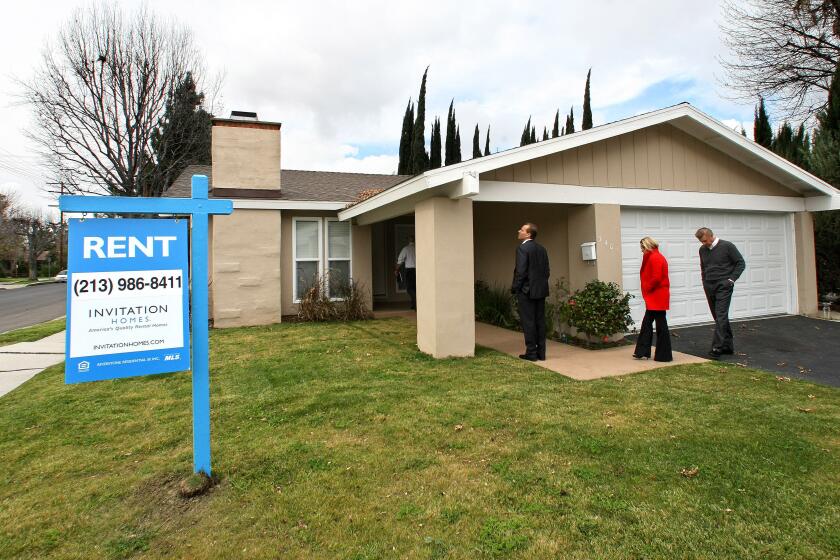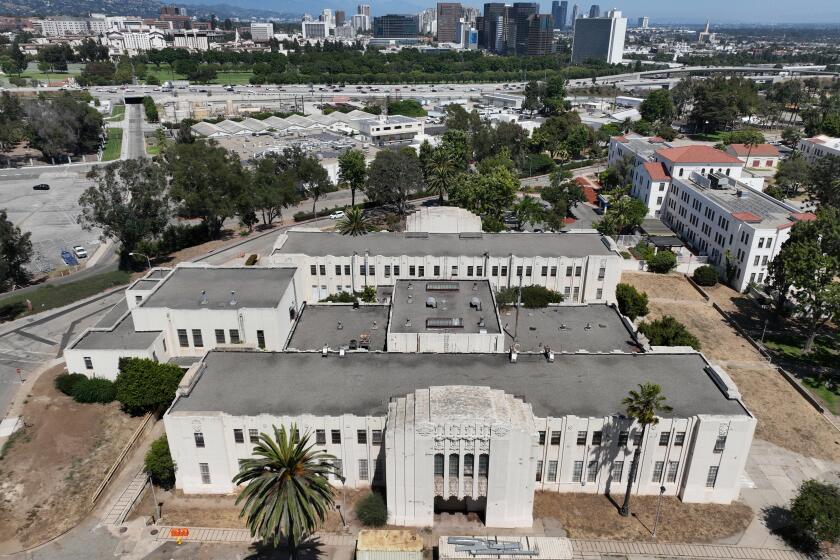First Trial of U.S. Judge on Racketeering Charges Is Set to Begin : Criminal justice: Robert Aguilar is accused of trying to influence two judges, lying to FBI agents and helping a fugitive friend.
Prosecutors call him the “defendant,” charged with the serious crimes of racketeering and obstruction of justice. Defense lawyers call him “judge.”
With his wire-rim glasses, salt-and-pepper hair and well-tailored suits, Robert P. Aguilar looks like a senior partner of a high-powered law firm. But today, the 58-year-old jurist will become the first sitting federal judge in the nation to go on trial on racketeering charges.
He also is the only federal judge based in California ever to face trial.
Aguilar was indicted on eight counts June 13. The most serious charge is that he turned his office into a racketeering enterprise in which he attempted to obstruct justice on behalf of friends and former clients. If convicted, he faces up to 55 years in prison, a $2-million fine and impeachment by Congress, the only way to oust a federal judge.
According to prosecutors, Aguilar tried to influence two judges in criminal cases, lied to FBI agents who questioned him about his associates, helped a friend remain a fugitive and told a felon his phones had been tapped.
Prosecutors Ralph D. Martin, Sara M. Lord and William A. Keefer of the Justice Department’s Public Integrity Unit do not allege that money changed hands. And from all appearances, Aguilar did not succeed in any effort to influence judicial decisions. But the prosecution hopes to persuade jurors that Aguilar knew he was using his special position to influence fellow judges.
The defense may acknowledge that Aguilar’s judgment in friends was bad. But San Francisco lawyers Patrick S. Hallinan, Hugh Levine and Charles Garry hope to persuade jurors that Aguilar never intended to improperly influence any case’s outcome.
The lawyers also are likely to argue that Aguilar, a liberal and a maverick, was singled out for prosecution because he had made enemies in the Justice Department by issuing several major rulings against the government.
Through it all, the defense hopes to portray Aguilar as a dignified man worthy of respect. Toward that end, they are fighting what they charge is a prosecution effort to “assassinate” his character. They asked the trial judge, U.S. District Judge Louis Bechtle of Philadelphia, to prevent the introduction of tape-recorded statements in which Aguilar remarks about his sex life and that of another judge.
Born in the San Joaquin Valley town of Madera, one of 11 children, Aguilar began his career in 1960 as a trial attorney in San Jose, handling a mix of criminal and civil matters.
Along the way, he dabbled in politics, befriended Rep. Don Edwards (D-San Jose), and shared a law office with Edwards’ son, Leonard. Gov. Jerry Brown appointed Aguilar to the Santa Clara Superior Court in 1979, and in 1980, President Jimmy Carter named him to the federal bench. Aguilar has said his proudest moment was when he gave the citizenship oath to his father, a Mexican immigrant.
As the trial begins, across from Aguilar will be sitting an unlikely pair of co-defendants, each charged with one count of conspiracy and facing up to 10 years in prison.
One is an aged, diminutive ex-convict named Abe Chapman, who generations ago gained the moniker “The Trigger.” He is a distant in-law of Aguilar’s, served four prison terms in the 1930s, ‘40s and ‘50s for drug offenses, and was part of the infamous gang Murder Inc.
Now 83 and arthritic, the cigar-smoking Polish immigrant apparently is too infirm to sit still for an entire day in court. On Friday, as lawyers debated points of law as a prelude to the start of jury selection today, Chapman picked up his trench coat and mumbled that he meant no disrespect to the judge. While his lawyer, Stephen B. Krimel of San Diego, tried to explain away his client’s problem, Chapman left the courtroom. Krimel hopes to find a place where his client can nap during breaks in what promises to be a six-week trial.
In 1987, the government charges, Chief U.S. District Judge Robert Peckham of San Francisco mentioned to Aguilar that Chapman’s phones had been tapped. Aguilar, in turn, let Chapman know, the government says.
The other defendant is Rudy Tham, 66, a craggy-faced, burly friend of Chapman’s who had never met the judge. In the late 1960s and ‘70s, Tham was perhaps the most powerful Teamster officer on the West Coast.
But then mobster Jimmy (the Weasel) Fratianno became a federal witness. And based on Fratianno’s testimony, Tham was convicted in 1980 of embezzling about $2,000 from a Teamster local in San Francisco.
In 1987, Tham, hoping to regain his role in the union, wanted to have his conviction overturned. Aguilar is accused of having advised Tham’s lawyer on how to present a proper argument that would sway U.S. District Judge Stanley Weigel.
The government contends that in exchange, Tham and Chapman promised to help find a job for one of Aguilar’s brothers, a recovering alcoholic. Prosecutors, however, conceded in a brief that Aguilar “showed a certain reluctance to be pulled completely into their scheming.”
Aguilar might never have become a target of investigation if the Organized Crime Strike Force had not opened a wide-ranging investigation of another man Aguilar had never met.
Starting in 1986, authorities tapped the phones of Angelo Commito, then a Marin County businessman who sold health plans to unions. The taps resulted in indictments against Commito and associates in Baltimore, Chicago, Atlanta, San Diego and San Francisco. Commito was accused of fraud in the sale of benefit plans.
The Commito taps resulted in or helped fuel other investigations, ranging from allegations of extortion of Hollywood entertainment companies to a scheme involving kickbacks in the manufacture and sale of wooden pallets.
Although Aguilar never was overheard on the Commito taps, Tham and Chapman were Commito associates. As part of the investigation, state agents had Chapman under surveillance in July, 1987, when he had lunch with Aguilar.
In a twist, U.S. District Judge Marilyn Patel of San Francisco last year threw out much of the case against Commito, ruling the government illegally tapped his phones. The ruling, which is on appeal, placed cases against him and his co-defendants across the country in limbo.
Similarly, lawyers for Tham, Chapman and Aguilar have asked Bechtle to suppress much of the evidence against their clients, noting the Aguilar investigation stemmed at least in part from the illegal Commito wiretap. Bechtle promised a ruling by today.
In addition to the charges involving Tham and Chapman, Aguilar is accused of helping Vera Hoff, 66, while she lived in Mexico as a fugitive from a tax evasion sentence. Hoff is a friend, former client and one-time secretary for Aguilar. She was arrested in Texas last year and is expected to be called by the prosecution as a witness in the Aguilar case.
The government alleged that as she was preparing to flee in 1979, Hoff sold her San Jose home to Aguilar at “generous” terms. Aguilar allegedly helped Hoff buy a condominium in Acapulco in 1980. And, prosecutors allege, Aguilar and a “girlfriend” visited Hoff in Acapulco in 1982 and talked about getting $200,000 he owed her across the border. Garry, one of Aguilar’s lawyers, called the charge “an outright lie.”
A final charge against Aguilar involves another old friend, Ronald V. Cloud, a wealthy Fresno businessman who once owned the Cal-Neva Lodge casino in Lake Tahoe. In October, 1983, the Nevada gaming commission, which found many irregularities at the Cal-Neva, refused to extend Cloud’s gambling license. Cloud was forced to sell the casino. In 1986, he was charged with fraud in the sale.
Aguilar allegedly told U.S. District Judge Samuel Conti, who was hearing Cloud’s case, that Cloud was “an old man and he’s a friend of mine,” a comment the government charges was an attempt to influence Conti. Cloud, once a client of Aguilar, nonetheless was convicted in 1987. Conti ordered that he pay $8 million in fines and restitution.
While Cloud appealed, the government charges, Aguilar told Cloud he had asked U.S. District Judge Robert Takasugi of Los Angeles about the legal abilities of Cloud’s appellate lawyer, Howard Weitzman. “Of course, I did not reveal my interest” to Takasugi, Aguilar was quoted as telling Cloud. The U.S. 9th Circuit Court of Appeals affirmed Cloud’s conviction last year.
More to Read
Sign up for Essential California
The most important California stories and recommendations in your inbox every morning.
You may occasionally receive promotional content from the Los Angeles Times.









